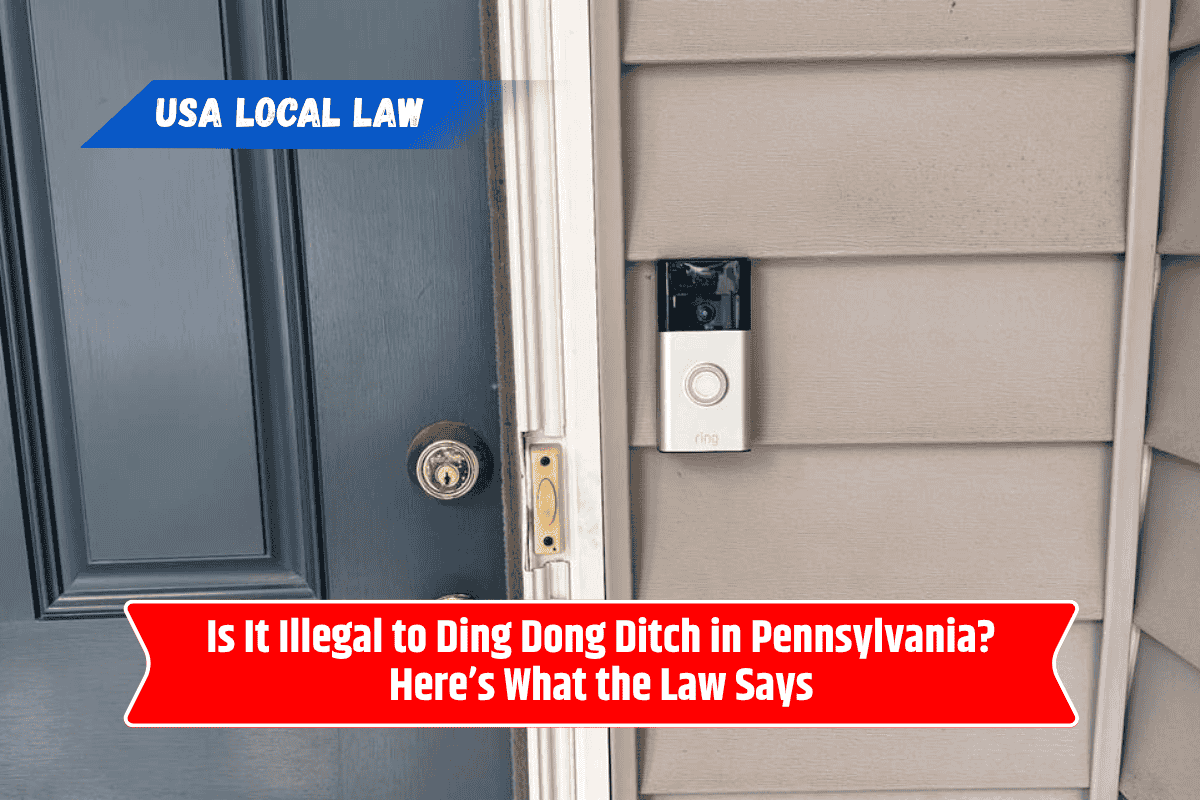Ding dong ditch is a classic prank that many of us have tried at some point: ringing someone’s doorbell and running away before they can answer the door. While this may seem harmless and even funny in theory, it can actually have legal consequences.
In Pennsylvania, as in many other states, this seemingly innocent prank can land you in hot water. In this article, we’ll explore the legal risks associated with ding dong ditching in Pennsylvania and whether or not it’s something you should think twice about before doing.
What is Ding Dong Ditch?
Ding dong ditch is a prank where someone rings a doorbell, knocks on a door, or performs a similar action and then runs away quickly before the homeowner can open the door. It’s often done for fun, but it can cause confusion, frustration, or even fear for those on the receiving end.
While it may seem like a harmless joke, the person playing the prank could be breaking the law, especially if they are trespassing or causing a disturbance. In Pennsylvania, like in many other states, the legal system does not take kindly to pranks that interfere with someone’s peace, privacy, or property.
The Legal Consequences of Ding Dong Ditching in Pennsylvania
In Pennsylvania, there are a few laws that could apply to ding dong ditching, especially if the prank escalates into more than just ringing a doorbell. Let’s look at some of the potential legal issues that could arise from this prank.
Trespassing Laws
One of the primary legal issues with ding dong ditch is that it may involve trespassing. In Pennsylvania, trespassing laws state that it is illegal to enter someone’s property without permission.
While ringing a doorbell might seem harmless, if you step onto someone’s property to ring their doorbell or knock on their door, you could technically be trespassing, even if it’s only for a moment.
If a homeowner feels that their property has been invaded or their peace disturbed, they could file a complaint. While a single ding dong ditch prank is unlikely to lead to serious charges, repeated pranks or particularly invasive actions could result in legal consequences.
Disorderly Conduct
Even though ding dong ditching may not seem like a major disturbance, it can lead to a charge of disorderly conduct under Pennsylvania’s laws. Disorderly conduct is generally defined as actions that cause a public inconvenience, annoyance, or alarm.
If you’re ringing doorbells in a neighborhood and disrupting the peace by causing people to become alarmed or confused, you could be charged with disorderly conduct.
In Pennsylvania, disorderly conduct can include actions like:
Engaging in fighting or threatening behavior
Creating hazardous or physically offensive conditions
Creating unreasonable noise or disturbance
If the prank causes someone to feel unsafe, frightened, or upset, you could be cited for disorderly conduct.
Harassment
If you repeatedly ding dong ditch someone or do it in a way that causes them emotional distress or fear, you could be charged with harassment.
Harassment laws in Pennsylvania prohibit actions that cause another person to feel distressed, scared, or alarmed. Continuous pranks that involve repeated visits to the same person’s house could be seen as harassment.
Pennsylvania law defines harassment as a pattern of behavior that can include things like:
Following or stalking someone
Making repeated phone calls or messages
Causing fear, alarm, or distress
If your ding dong ditching behavior crosses the line into harassment, it could result in criminal charges and legal consequences.
Other Potential Issues
Beyond trespassing, disorderly conduct, and harassment, there are other potential issues that could arise from ding dong ditching in Pennsylvania.
Safety Risks
While ding dong ditching is typically intended to be a harmless prank, it can sometimes cause safety concerns. If a person is startled by the doorbell ringing, they might rush to answer the door and potentially slip, trip, or fall, leading to injury.
If you cause someone to get hurt as a result of your prank, you could be held liable for the injury, and the situation could escalate into a personal injury lawsuit.
Disturbing the Peace
If a homeowner or their family members feel harassed or disturbed by repeated pranks, they may feel the need to call the police or even escalate the situation. Repeatedly ringing doorbells could be considered disturbing the peace, especially if it’s done late at night or early in the morning when the homeowner expects peace and quiet.
In Pennsylvania, ding dong ditching can be illegal, depending on how it’s done. The prank itself could lead to charges of trespassing, disorderly conduct, or harassment, especially if it causes disturbance or distress to the homeowner.
While a single instance of ding dong ditching may not seem like a big deal, if it escalates into repeated actions or results in injury or emotional distress, it can lead to serious consequences.
So, before you decide to prank your neighbors, think about the potential legal implications and whether it’s worth the risk. What might seem like harmless fun could quickly become a legal headache. It’s always better to find a way to have fun that doesn’t involve breaking the law or making others uncomfortable.
